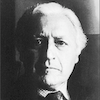I see. So this distinguishes fascism from simple conservative nationalism? Fascism is revolutionary and against the old order?
Conservative nationalism can imply any movement or figure from French Bonapartists to Suharto, who you mention earlier. Fascism is a specific doctrine, and one sure way to distinguish would be that capitalism does not remain in place within a Fascist state; at the very least it is significantly modified in a transitional period. To paraphrase, "Fascism
is Corporatism" (Mussolini).
To me it seems like a very distinct ideology which people wrongfully label others with. Would you say it is possible to be a conservative, nationalist, anti-liberal and traditionalist without being a fascist?
Yes, although the traditionalism would likely not veer into the realm of palingenetic thought. A traditionalist conservative will attempt to preserve the status quo, perhaps reaching back forty or fifty years as a frame of reference. Fascist theory takes into account the full history of a people, and while the creation of some idealized time in the past is not the exact goal at all (Fascism does not reject transcendance/evolution, technology, etc.), it certainly will seek to draw upon and incorporate elements of a people's glorious history to give them perspective in moving forward in the future. Ioannis Metaxas did not seek to literally recreate ancient Sparta in the context of mid-20th century Greece, but the 4th of August government considered itself the third palingenetic incarnation of classical Greece (specifically ancient Sparta and Macedonia) and the Byzantine Empire. Likewise, the Third Reich was proposed as such an incanation of both the Holy Roman Empire and Wilhelmine Germany (Otto von Bismarck's German Empire of the Hohenzollern dynasty). Of course everyone knows of Fascist Italy's inspiration in Ancient Rome. There are countless examples. This also reveals itself in the imagery - the fasces (or fascio), the labrys, the swastika, etc. Ancient symbols of a people. Such notions couldn't be further from conservative thought in the 20th century.
To draw a distinct parallel, look at Falangist thought in Spain, which, although surely not a strict Catholic entity at all, was syncretic (and palingenetic) in thought, emphasizing pride in and inspiration from the original Iberian peoples, the Catholic Monarchs (Ferdinand and Isabella), militaristic and cultural achievements of the Spanish Empire in the Age of Discovery, etc.
What you are referring to (conservative anti-liberal, traditional nationalism, authoritarianism) would be found in figures such as Francisco Franco, Antonio de Oliveira Salazar, Joseph de Maistre, Otto von Bismarck, Daniel Francois Malan, Chiang Kai-Shek, perhaps even Ion Antonescu.
Was Franco not fascist in the sense that he sough to preserve the status quo and was deeply conservative?
Yes, although it is difficult for theorists and historians to say what exactly Franco believed on every policy issue as he was first and foremost a pragmatist whose views changed over the course of time, possibly for strategic reasons. An example would be the recalling of the Azul Division (Spanish Blue Divsion which fought alongside Axis forces on the Eastern Front). One could say that such instances and the eventual liberalization of the Spanish economy following meetings with officials of the Eisenhower administration long after the war were results of the balance of power tipping toward Allied states, but Franco never had a firm interest in the revolutionary changes - economic, political, social, and spiritual - that Axis forces intended to impose from above on continental Europe and certainly no interest in a military coalition with the Fascist states following the conclusion of the Spanish Civil War. This shows in his making ridiculous demands of Hitler as a precondition for Spanish entry into the war such as excessive shipments of grain and materiale, and all of Vichy-held French North Africa.
Can we also say that those such as Engelbert Dolfuss were also not fascists but simply extreme conservatives? Yet he claimed to be a fascist and was recognised by Mussolini as such.
Engelbert Dollfuß was a Fascist. Austrofascism was a Fascist ideology, seeking the revolutionary change of Austrian society through the creation of workers' guilds (Cooperatives), the transition of the Austrian economy through autarkic policies, the creation of the one-party state as a vanguard to the exclusion of liberals and social democrats, Marxists, etc. In addition, Austrofascism can certainly be labeled palingenetic, because it sought the radical re-establishment of Vienna as a centre of power in Western civilization and a strong stance against ideological incursions from the East (recalling the Siege of Vienna and the Austrian resistance to the Ottoman Empire's advance in Europe in the Baroque period) directed against Bolshevism. The problem is that Austrofascism didn't have long stable conditions to develop and mature due to external factors.
.
[Do you think Chiang Kai Shek was a fascist?
No, Chaing Kai-Shek was an opportunist (cooperating with Mao and Western iiberals throuh the Flying Tigers and other assistance programs designed to bolster his regime) and the mainstream Kuomintang were absolutely not Fascist. For a look at Fascism in republican China, look to the Blue Shirts Society and Wang Jingwei.
This is most notable when you look at a map of the Spanish Civil War and see how the Nationalists were headquartered in the north, swung west, and took Madrid in the very end despite being in the centre of the country.
A frontal attack on Madrid was delayed because of the Italian/Nationalist defeat in '37 at the Battle of Guadalajara, in which Mario Roatta and the Corpo Truppe Volontarie (Italian volunteers in Spain) were routed following the Spanish failure/reluctance to follow through on their preconceived order of battle which involved an offensive toward Alcalà de Henares.
"I am never guided by a possible assessment of my work" - President Vladimir Putin
"Nations whose nationalism is destroyed are subject to ruin." - Muammar Qaddafi








 - By Pants-of-dog
- By Pants-of-dog - By Potemkin
- By Potemkin